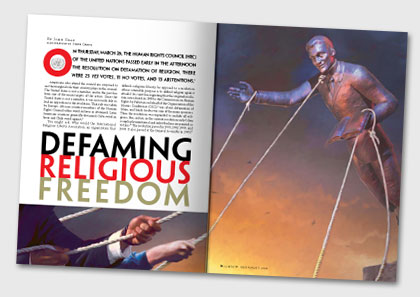Defaming Religious Freedom
John Graz July/August 2009
On Thursday, March 26, the Human Rights Council (HRC) of the United Nations passed early in the afternoon the Resolution on Defamation of Religion. There were 23 yes votes, 11 no votes, and 13 abstentions.1
Americans who attend the council are surprised to see the marginal role their country plays in the council. The United States is not a member, and in the past has been one of the main targets of the critics. Since the United States is not a member, it was not easily able to lead an opposition to the resolution. That role was taken by Europe. African country members of the Human Rights Council either voted in favor or abstained: Latin American countries generally abstained: Cuba voted in favor and Chile voted against.2
You might ask, Why would the International Religious Liberty Association, an organization that defends religious liberty, be opposed to a resolution whose ostensible purpose is to defend religion against attacks? It is worth recognizing that the original resolution, introduced in 1999 to the Commission on Human Rights by Pakistan on behalf of the Organization of the Islamic Conference (OIC),3 was about defamation of Islam, and Saudi Arabia was one of the main sponsors. Then the resolution was expanded to include all religions. But, in fact, in the current resolution only Islam is explicitly mentioned and only Muslims are painted as victims.4 The resolution passed in 2001, 2002, 2003, and 2005. It also passed at the General Assembly in 2005,5 after being introduced by Yemen on behalf of the OIC.6
Yes, there are positive aspects to the resolution: things such as encouragement toward education about various religions in schools, a call for interreligious dialogues, and respect for all religions in general. There has been legitimate concern about Islamaphobia in Western countries since September 11, 2001. But it would have been far better if the resolution had also mentioned all the problems and discrimination Christians and other religious groups face— particularly in the countries represented by members of the HRC and the OIC.7
However, it is useful to remember that the purpose of human rights is to defend and protect individuals, groups, and properties—not religions or ideas. So a call to violence or murder against the members of a religion should be punished. This is covered in Article 20 of the International Covenant on Civil and Political Rights (ICCPR). The covenant has been signed by many countries and it is a binding document for them. It will be interesting to see how the country members of the HRC observe this covenant. Another problem with the resolution is that it puts on the same level Defamation of Religions and Incitement to Hatred andViolence.8
We believe everyone has the right to critique a religion and its leaders as long as he or she does not call people to discrimination, hatred, and violence. This right is part of our precious freedom of expression (Article 19 of ICCPR). The resolution “urges States to provide, within their respective legal and constitutional systems, adequate protection.”9 A new law will create more problems than it solves. What is the legal definition of defamation? Where does defamation begin and where does it end? When does a critique become defamation?
It is true that an aggressive attack on a religion may feed hatred and encourage violence and discrimination. In some parts of the world religious minorities have experienced this. It was the case of Christians in Pakistan, Indonesia, and Somalia after some unfortunate statements by Christian leaders about Islam. The margin between attacks on religion and attacks on symbols, property, and members of that religion may be narrow. This is why we should give attention to the concern behind the resolution. The International Religious Liberty Association has done this for several years. Its Sixth World Congress and its Tenth Meeting of Experts focused specifically on defamation of religion.10
We think the best way to oppose defamation of religion is to be proactive in multiplying interreligious meetings and relations. We also think, as we have already expressed in the first two meetings of IRLA Experts (1999-2000), a Code of Good Conduct should be worked on by all actors.11 After the cartoon on Muhammad was published in Denmark, we saw that countries that had strong traditions of interfaith relations were less affected by violence. This indicates that when a religion is defamed, leaders of other religious organizations should play the role of peacemakers and bridge builders. Where there is no freedom of expression, legislation against defamation of religion will be used by the government or by the religious majority to discriminate against minorities and to suppress what could be useful and healthful critiques.
- Resolution (A/HRC/10//L.2/Rev 1). Resolution 7/19. Combating Defamation of Religions. Azerbaijan, China, Cuba, Pakistan, Russian Federation, Saudi Arabia, and Sri Lanka are among the 23 votes in favor.
- See United Nations press release, “Council Establishes New Expert in Field of Cultural Rights, Extends Mandate on Democratic People’s Republic of Korea for One Year.” HRC, afternoon, March 26, 2009, pp. 18-22.
- It appeared on the agenda as an item on “racism.” See the analysis of The Becket Fund at www.becketfund.org.
- See Human Rights Council, Resolution 7/19, Combating Defamation of Religions.
- A/HRC/10/I.2.
- GA Res 60/15, UN Doc A/Res/60/150 (January 20, 2006).
- Read the Annual Report on International Religious Freedom published by the United States Department of State and other reports on religious freedom in the world.
- Idem.
- The U.S.A. did not sign.
- The Tenth IRLA Meeting of Experts opposed the resolution because of its risk to freedom of expression. A final statement will be issued after the Eleventh Meeting in September 2009.
- See Fides et Libertas, 2000.
Article Author: John Graz
John Graz is secretary-general of the International Religious Liberty Association.